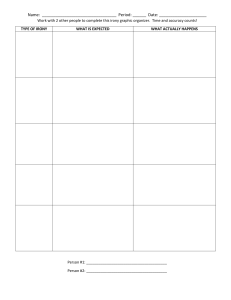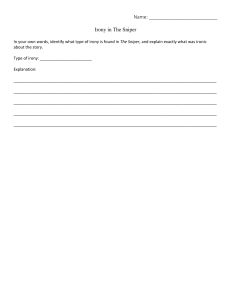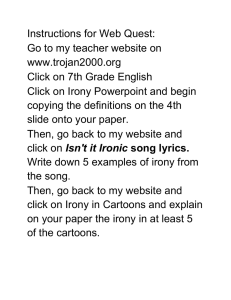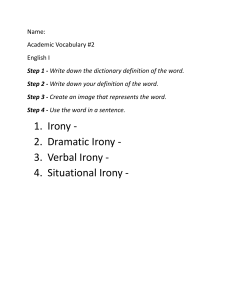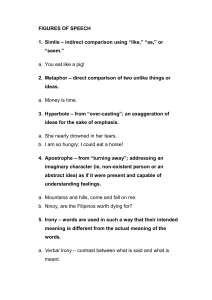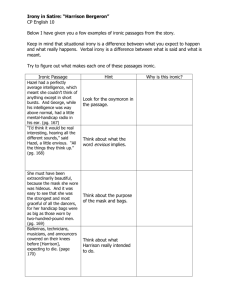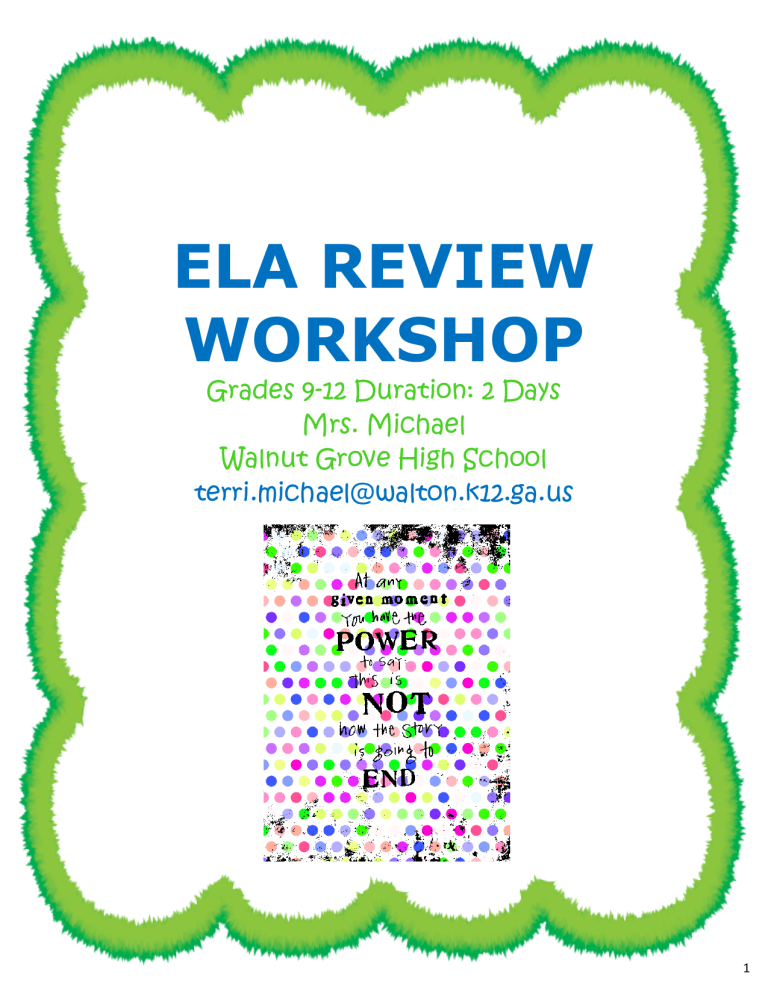
ELA REVIEW WORKSHOP Grades 9-12 Duration: 2 Days Mrs. Michael Walnut Grove High School terri.michael@walton.k12.ga.us 1 Workshop Schedule Monday 8:00-8:30 Meet and Greet 8:30-8:45 Workshop Overview 8:45-10:45 Literary Elements Activity (whole group/individual practice) 10:45-11:00 Break 11:00-11:45 Grammar Basics (whole group/individual practice) 11:45-12:00 Wrap Up Tuesday 8:00-8:15 Review Monday 8:15-10:15 Reading Practice-Close Reading (whole group/individual practice) 10:15-10:30 Break 10:30-11:00 Literary Movements (whole group/individual practice) 11:00-11:30 Grammar Basics (individual practice) 11:30-12:00 Research and MLA http://www.myprimaryparadise.com/author/admin/ 2 Introductions 1. Introduce yourself using your first name and three words that describe you that begin with the first letter of your first, middle, and last names. For example . . . My name is Terri New Michael so I would say, “My name is Terri. I am a teacher, I am nutty, and I am a mother.” Now you. First write it all down . . . __________________ _____________________ _____________________ First middle last Now three words that describe you using first letter of each name __________________ _____________________ _____________________ 2. Two Truths and a Lie Write two things that are true about you and one thing that is not. Truths: ___________________________________________________________ ___________________________________________________________ Lie: ___________________________________________________________ Now we will share and guess which is the lie. 3 We will review the following during this workshop: 4 Literary Elements-Figurative Language Fancy, poetic, picture words that dress up writing Personification: giving an inanimate object human characteristics Examples • When the stars threw down their spears and water'd heaven with their tears • It is dreams that have destroyed us • The dilapidated house appeared tired and depressed. • I watched as the tree stretched its arms in the breeze. WATCH THIS VIDEO: http://m.youtube.com/watch?v=RKexdSZNiLc Hyperbole: exaggeration Examples • The score stood four to two, with but one inning left to play. And then when Cooney died at first, and Barrows did the same • Oh, never, if I live to a million, shall I feel such a terrible pain. • I am so hungry, I could eat a horse. WATCH THIS VIDEO: http://m.youtube.com/watch?v=RKexdSZNiLc Metaphor: a DIRECT comparison between two unlike things Examples • The moon was a ghostly galleon tossed upon cloudy seas, The road was a ribbon of moonlight over the purple moor • My brain is fire--my heart is lead • I hold the world buts as the world, Gratiano;/A stage where every man must play a part, And mine a sad one. Simile: a comparison between two unlike things using the words "like" or "as" Examples • As flies to wanton boys, are we to the gods./They kills us for their sport. • O my luve's like a red, red rose,/ That's newly sprung in June;/O my luve's like the melodie/ That's sweetly played in tune. • I wandered lonely as a cloud /That floats on high o'er vales and hills WATCH THIS VIDEO: http://m.youtube.com/watch?v=RKexdSZNiLc Paradox: a statement that seems at odds with itself but is actually true. Examples • It is the beginning of the end. • To die to Christ is to live. • Men work together whether they work together or apart. • Sometimes you have to be cruel to be kind. • What a pity that youth must be wasted on the young. 5 Figurative Language Our Way • Let's write a poem that includes 2 examples of each: • personification, hyperbole, metaphor, simile and paradox • Topic? • Type of poem? __________________________ _________________________________________________________ _________________________________________________________ _________________________________________________________ _________________________________________________________ _________________________________________________________ _________________________________________________________ _________________________________________________________ _________________________________________________________ _________________________________________________________ _________________________________________________________ _________________________________________________________ _________________________________________________________ _________________________________________________________ _________________________________________________________ _________________________________________________________ _________________________________________________________ 6 7 Another literary device that confuses students is IRONY, so let’s spend some time talking about it. IRONY (has nothing to do with ironing) When you think “irony,” think “opposite.” According to http://artsbeat.blogs.nytimes.com/2008/06/30/isnt-it-ironic-probably-not/, Irony requires an opposing meaning between what’s said and what’s intended. Sounds simple, but it’s not. A paradox, something that seems contradictory but may be true, is not an irony. The Times stylebook, Which . . . offers useful advice: The loose “use of irony and ironically, to mean an incongruous turn of events, is trite. Not every coincidence, curiosity, oddity and paradox is an irony, even loosely. And where irony does exist, sophisticated writing counts on the reader to recognize it.” Alanis Morissette’s song “Ironic” is equally useful. If it rains on your wedding day, that’s a coincidence, not an irony. If you win the lottery and drop dead before claiming the money, it’s good luck followed by bad luck. If you meet the man of your dreams and then meet his beautiful wife, it’s a bummer. But if a song called “Ironic” contains no irony, is that in itself ironic? Nope. It may just be … dumb. It depends on the creator’s intent. So, as has been suggested, if Morissette purposely wrote a song called “Ironic” that contained no irony at all, is that ironic? Let’s listen and look . . . "Ironic" by Alanis Morissette http://www.youtube.com/watch?v=xFQypLPZejA An old man turned ninety-eight He won the lottery and died the next day It's a black fly in your Chardonnay It's a death row pardon two minutes too late And isn't it ironic... don't you think Well life has a funny way of sneaking up on you When you think everything's okay and everything's going right And life has a funny way of helping you out when You think everything's gone wrong and everything blows up In your face It's like rain on your wedding day It's a free ride when you've already paid It's the good advice that you just didn't take Who would've thought... it figures A traffic jam when you're already late A no-smoking sign on your cigarette break It's like ten thousand spoons when all you need is a knife It's meeting the man of my dreams And then meeting his beautiful wife And isn't it ironic...don't you think A little too ironic...and, yeah, I really do think... Mr. Play It Safe was afraid to fly He packed his suitcase and kissed his kids goodbye He waited his whole damn life to take that flight And as the plane crashed down he thought "Well isn't this nice..." And isn't it ironic... don't you think It's like rain on your wedding day It's a free ride when you've already paid It's the good advice that you just didn't take Who would've thought... it figures It's like rain on your wedding day It's a free ride when you've already paid It's the good advice that you just didn't take Who would've thought... it figures Life has a funny way of sneaking up on you Life has a funny, funny way of helping you out Helping you out 8 Let’s look at irony in literature. There are three types: 1. Verbal irony: saying one thing but meaning the exact opposite. (Sarcasm) For example, you ask your teacher if it’s okay if you turn in your paper two days late, and he/she responds: “Sure. I love it when students turn assignments in late.” Does he/she really mean this? OF COURSE NOT!!!! 2. Dramatic irony: when the audience knows more about what is happening in a story than a character does. (Oedipus Rex is the classic example of this. For a quick summary, go to http://www.shmoop.com/oedipus-the-king/summary.html.) Bottom line of Oedipus Rex, the audience knows Oedipus killed his father and married his mother and had three children wither, but Oedipus does not know this. 3. Situational irony: occurs when what happens in a story is the opposite of what was expected to happen or what should have happened. One example is The Wizard of Oz. The scarecrow, tinman, and lion travel to Oz to ask the wizard for a brain, a heart, and courage only to find out they had these all along. Another example is Macbeth. The witches tell Macbeth that he will be king, but do not tell him what happens after that. Great summary from http://www.ereadingworksheets.com/reading-worksheets/three-types-of-irony-lesson.htm Something that is ironic is unexpected. If unexpected by a character, it’s dramatic. If unexpected by everyone, it’s situational. If it’s sarcasm, it’s verbal. Now, let’s look at other examples and see if you can identify the type 0f irony . . . verbal, dramatic, or situational. Irony worksheet 1: http://www.ereadingworksheets.com/reading-worksheets/irony-worksheet.htm Irony worksheet 2: http://www.ereadingworksheets.com/reading-worksheets/irony-worksheet-2.htm 9 Five more literary devices that may be on the test are: Foreshadowing Flashback Epistolary Synecdoche Metonymy Quick Review Foreshadowing: when the writer hints at what is to come in the story Juliet says, "Methinks I see thee, now thou art below,/ As one dead in the bottom of a tomb:/ Either my eyesight fails, or thou look'st pale." These lines foreshadow Romeo's death later in the play. Romeo hints at Juliet's impending death, as well, when he responds, "And trust me, love, in my eye so do you." This is one of many examples of language centered on death and suicide used in the play to heighten the audience's anticipation of events to come. http://www.reference.com/motif/reference/example-of-foreshadowing-in-romeo-and-juliet Flashback: writer interrupts story with events from an earlier time in order to provide needed information to the reader J.K. Rowling used this literary device when Harry would remember, or flashback, to the night of his parents’ deaths. Epistolary: using letters to help tell a story The novel Frankenstein uses letters from Robert Walton to his sister Mrs. Saville as part of the storytelling. Synecdoche: A part of a thing or object is commonly used in place of the whole thing. The term field "hand" is often used to represent an entire person who works on a farm. The word “head” refers to cattle. The word “bread” can refer to food in general. Metonymy: A thing or object commonly associated with something is substituted for that thing. The word "crown" is often substituted for king or queen. The word “pen” for written words. "In a corner, a cluster of lab coats made lunch plans." (Karen Green, Bough Down. Siglio, 2013) GO TO http://quizlet.com/4415606/ghsgt-figu-language-flash-cards/ and work with flashcards AND http://quizlet.com/1996901/michael-literary-elements-fiction-flash-cards/ 10 Writing Basics Review 1. Place a comma before a coordinating conjunction F_____ A_____ N_____ B_____ O_____ Y_____ S_____ For example . . . I will eat the cake, and Sam will eat the ice cream. Remember . . . COMMA, Conjunction WATCH THIS VIDEO: http://m.youtube.com/watch?v=k2ug9xr0Ias Let's practice . . . Click on the following links http://www.quia.com/quiz/1488487.html?AP_rand=1494229200 http://www.proprofs.com/quiz-school/story.php?title=coordinating-conjunctions-quiz Write five compound sentences using a different FANBOYS for each sentence. 2. Place a comma after an introductory dependent clause. To understand this rule, you must know the difference between dependent clauses and independent clauses Remember the definition of a simple sentence . . . well that is also the definition of an independent clause. Not all groups of words with a subject and a verb can stand alone and express a complete thought. For example . . . While I was waiting for the bus Contains a subject and verb, I was waiting, but does it express a complete thought? The answer is NO. You are still waiting on more information, aren't you. While I was waiting for the bus, is a dependent clause. It needs another clause added to it, or it "depends" on another clause to express a complete thought. While I was waiting for the bus, I talked with a very nice gentleman. This expresses a complete thought, and is a complex sentence. "I talked with a very nice gentleman" is an independent clause. It doesn't depend on other words in order to express a complete thought. So, what you need to take away from this is . . . Place a comma after a dependent clause when it comes first in a complex sentence. EXAMPLES . . . If you go to the dance tonight, take your cell phone with you. Before Sammy decided on a college, he visited several with his parents. WATCH THIS VIDEO: http://m.youtube.com/watch?feature=plpp&v=Ps6q_5zpBew Let's practice . . . http://lessons.englishgrammar101.com/EnglishGrammar101/Module5/Lesson5-9.aspx 11 3. Set off nonessential clauses with commas Essential clauses are just that. They are "essential" or necessary to complete the meaning of the sentence. Nonessential clauses are just added information, that if removed from the sentence, do not change the meaning of the sentence WATCH THIS VIDEO: http://m.youtube.com/watch?v=Ns6TjF62RD0 Now go to this site to practice: http://www.quia.com/quiz/300693.html?AP_rand=691471300 4. Don't confuse homonyms it's their your its there they're you're WATCH THESE VIDEOS: http://m.youtube.com/watch?v=SXfT5W7MyIs http://m.youtube.com/watch?feature=related&v=jdyhxtIZsJc http://m.youtube.com/watch?v=XJp3_t84Jgk Now, you practice . . . http://www.chompchomp.com/hotpotatoes/wordchoice13.htm http://www.chompchomp.com/hotpotatoes/wordchoice01.htm http://www.funtrivia.com/playquiz/quiz536616276a0.html 5. Parallelism Think of the math concept of parallel lines. They flow along together nice and smoothly. Just look at the images. The parallel lines seem at peace. The intersecting lines seem a little chaotic. Now, think about words, phrases and clauses. They must flow smoothly, also, or they cause chaos in the reader's mind. WATCH THIS VIDEO: http://m.youtube.com/watch?v=A2OxxVcCrG8 Now you practice: http://www.chompchomp.com/structure01/structure01.htm http://www.chompchomp.com/structure02/structure02.htm http://www.chompchomp.com/structure04/structure04.htm 6. Avoid writing run-ons, comma splices, and sentence fragments Run-ons and comma splices are basically the same error. You are incorrectly joining two sentences. How they are different: Run-on . . . trying to join two sentences with no punctuation. Michael ran to the finish line Bobby walked all the way. Comma Splice . . . trying to join two sentences with just a comma. Michael ran to the finish line, Bobby walked all the way. 12 Two ways to correct the sentence . . . Michael ran to the finish line. Bobby walked all the way. OR Michael ran to the finish line, but Bobby walked all the way. Let's practice . . . http://www.chompchomp.com/csfs01/csfs01.htm http://www.chompchomp.com/csfs02/csfs02.htm http://www.chompchomp.com/csfs02/csfs02.htm Now, let's look at sentence fragments. A sentence fragment is a group of words that act like a sentence but do not express a complete thought. For example, a dependent clause is a sentence fragment . . . While I was waiting for the bus. Other types are: Swimming in the pond. The singing bird. WATCH THIS VIDEO: http://m.youtube.com/watch?v=mQfJdhyeQfU Let’s practice . . . http://www.chompchomp.com/frag01/frag01.htm http://www.chompchomp.com/frag02/frag02.htm http://www.chompchomp.com/frag03/frag03.htm 13 Tips on Effectively Reading Passages Close Reading Strategies No reader, no matter how strong he or she is, can read a passage one time and grasp it all. Good readers use strategies to help them remember the information. For this test, use the following strategies: 1. Read the passage first before looking at the question. 2. Underline or circle important words and phrases 3. Write any questions, ideas, or connections in the left margins that come to mind as you read. 4. For each paragraph, write a quick “text message” type summary in the right margin. 5. Now read the question. 6. Reread the passage and choose the best answer. Let’s practice . . . 14 PLEASE FEEL FREE TO MARK UP THESE PASSAGES. From: Collins, Suzanne. The Hunger Games. London: Scholastic, 2011. Print. Which answer represents a simile used in the passage? a. . . . Prim, curled up on her side, cocooned in my mother’s body, their cheeks pressed together. b. Prim’s face is as fresh as a raindrop . . . c. . . . as lovely as the primrose for which she was named. d. b and c Which answer represents the use of hyperbole in the passage? a. Sitting at Prim’s knees, guarding her, is the world’s ugliest cat. b. He hates me. Or at least distrusts me. c. . . . belly swollen with worms . . . d. None of the above 15 From Green, John. The Fault in Our Stars. New York: Dutton Books, 2012. Print. What is the writer’s tone in this passage? a. Hopeful b. Depressed c. Sarcastic d. Cheerful The heart of Jesus represents a ___________. a. Simile b. Paradox c. Metaphor d. Hyperbole 16 From: Houston, Jean. The Wizard of Us: Transformational Lessons from Oz. New York: Simon & Schuster, Inc., 2012. Print. The writer’s purpose in this passage is to a. Entertain b. Inform c. Persuade d. None of the above The main topic of this passage deals with a. Women as heroines b. The hero’s journey c. The Wizard of Oz d. None of the above 17 From: Abrams, David. Fobbit. New York: Black Cat, 2012. Print. The “mother’s skirt” described in the first passage is a metaphor to represent a. Scared, young soldiers b. FOB, or Forward Operating Base c. Generals d. Saddam Hussein’s marbled palaces The writer’s tone toward Fobbits is a. Patient b. Proud c. Confused d. Disdainful 18 MLA Book Citation Practice Last Name, First Name. Title of Book. City: Publisher, Year. Directions: Write the correct MLA Works Cited entry for each of the following books: 1. Title: How to Read Literature Like a Professor Author: Thomas C. Foster Year Published: 2008 City Published: Alexandria Name of Publisher: ASTD Press _______________________________________________________________ _______________________________________________________________ 2. Title: African-American Inventors Author: Patricia and Fredrick McKissack Year Published: 1994 City Published: Brookfield, IL Name of Publisher: Millbrook Press ______________________________________________________________ ______________________________________________________________ 3. Title: Community, Trade, and Networks: Southern Fujian Province from the Third to the Thirteenth Century. Author: Hugh R. Clark Year Published: 1991 City Published: Cambridge Name of Publisher: Cambridge UP ______________________________________________________________ ______________________________________________________________ 19 MLA Magazine Citation Practice Author’s Last Name, First Name. “Title of Article.” Title of Magazine. Date of Article: # of the page. Directions: Write the correct MLA Works Cited entry for each of the following magazines: 1. Author: Angela Pirisi Title of Article: Eye-catching advertisements Magazine: Psychology Today Date of article: Jan.-Feb. 1997 Page number: 14 ________________________________________________________________________ ________________________________________________________________________ 2. Author: Deborah Churchman Title of Article: Be a Nature Detective Magazine: Ranger Rick Date of article: Mar. 2002 Page number: 28-31 ________________________________________________________________________ ________________________________________________________________________ 3. Author: Susan Dominus Title of Article: Why Pretty Isn’t Pretty Enough Anymore Magazine: Glamour Date of article: Jan. 2004 Page number: 136+ ________________________________________________________________________ ________________________________________________________________________ 20 ANSWER KEY for MLA Citation practice: Books Foster, Thomas C. How to Read Literature Like a Professor. Alexandria: ASTD Press, 2008. Print. McKissack, Patricia and Frederick. African-American Inventors. Brookfield, IL: Millbrook Press, 1994. Print. Clark, Hugh, R. Community, Trade, and Networks: Southern Fujian Province from the Third to the Thirteenth Century. Cambridge: Cambridge UP, 1991. Print. Magazines Pirisi, Angela. “Eye-catching advertisements.” Psychology Today. Jan.-Feb. 1997: 14. Print. Churchman, Deborah. “Be a Nature Detective.” Ranger Rick. Mar. 2002: 28-31. Print. Dominus, Susan. “Why Pretty Isn’t Pretty Enough Anymore.” Glamour. Jan. 2004: 136+. Print. 21
